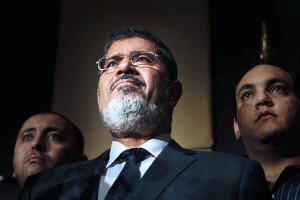A leading member of Egyptís ruling Muslim Brotherhood says that President Mohamed Morsiís visit to Iran this week demonstrates the Arab nationís ďindependenceĒ from the United States.

ďMorsiís presence in Tehran conveys this message to the US and Israel, that the era of Egyptís political obedience to Washington and Tel Aviv has ended,Ē Sabri Amer told Iranís Fars News Agency.
Morsi will be in the Iranian capital to attend the sixteenth summit of the Nonaligned Movement, a Cold War era organization that includes African, Middle Eastern and South Asian nations as well as several countries in Latin America.
In the interview, Amer lamented that while Hosni Mubarak was in power between 1981 and 2011, ďall the decisions and policies in both areas of domestic and foreign policy were made through coordination with the US and the Zionist regime,Ē or Israel, ďbut the conditions have now changed in Egypt and the era of the ruling of the Egyptian regimes which were allies and loyal to the West has ended.Ē
The Iranian Foreign Ministry similarly claimed that Morsiís visit will enhance Egyptian-Iranian relations even if he is scheduled to be in Tehran for just four hours on Thursday to hand over the presidency of the movement to the Islamic republic.
Iranís foreign minister Ali Akbar Salehi believes that his country is moving toward restoring diplomatic relations with Egypt. He told the Egyptian†Al-Ahram†newspaper last week that the Iranians ďwant relations of friendship and brotherhoodĒ with Egypt. Its ďrevolution,Ē he added, which included Mubarakís removal from office early last year, ďopened a new chapter in Egyptís relations with the outside world.Ē
Iranian state television reported on Sunday that Morsi will also visit the nuclear power plant in Bushehr in western Iran.
Iran and the West are locked in a diplomatic dispute over the formerís nuclear program which European nations, Israel and the United States suspect is designed to develop a nuclear weapons capability whereas Iran claims that its purpose is peaceful.
A spokesman for the Egyptian president denied on Saturday that Morsiís visit would be more than ceremonial. ďThe matter [of restoring diplomatic ties] is out of the question at this stage,Ē Yasser Ali told the Saudi newspaper†Asharq Al-Awsat.
That Ali chose a Saudi owned publication to dispel Iranian optimism about future relations with Cairo may have been coincidental but it is clear is that Riyadh and Tehran are vying for the Morsi Administrationís affections.
Under Mubarak, Egypt was a strong pillar of the American security order in the Middle East. In conjunction with Saudi Arabia, it upheld stable and nonthreatening relations with Israel and contained Iranian influence west of the Persian Gulf. The Egyptian army received hundreds of millions of dollars in annual military aid from Washington.
The demise of the military regime in Cairo, the generalsí attempts to curtail the Muslim Brotherhoodís rise notwithstanding, have, in the eyes of Iranian policy makers, provided an opening. If Egyptian ties with Riyadh and Washington can be severed, it could make up for the nigh inevitable collapse of the Bashar al-Assad regime in Syria which is currently Iranís only Arab ally.
However, Egypt has a pressing financial interest in preserving, or salvaging, relations with the Americans and the Saudis.
The Iran Project is not responsible for the content of quoted articles.











